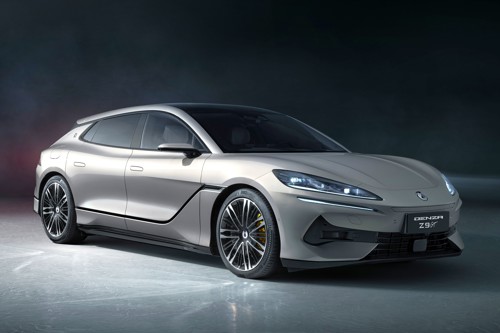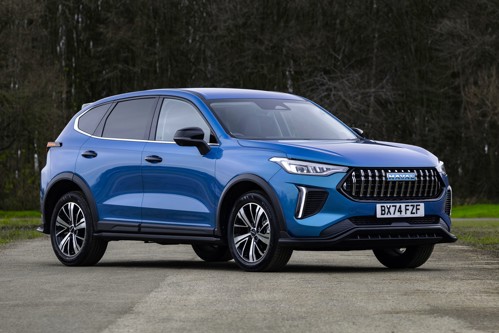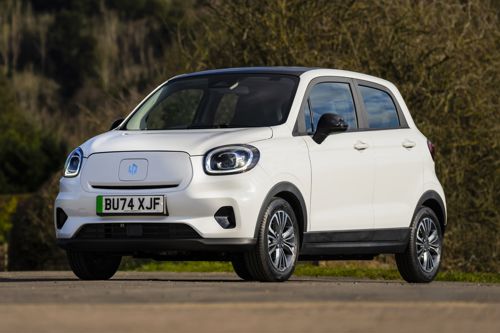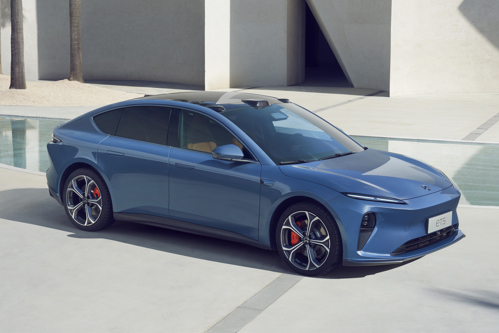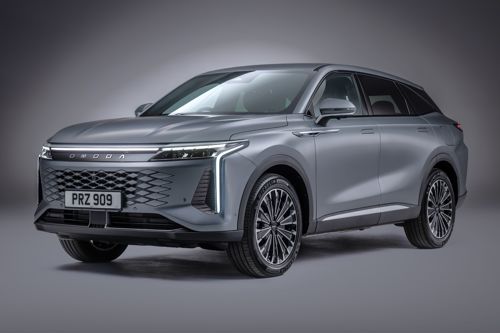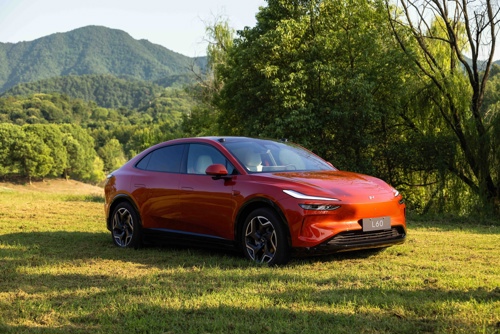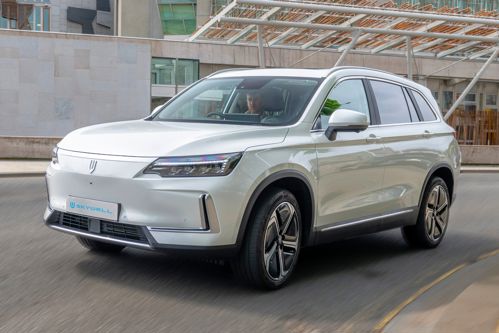Chinese car brands in the UK: the complete A-Z guide for 2026
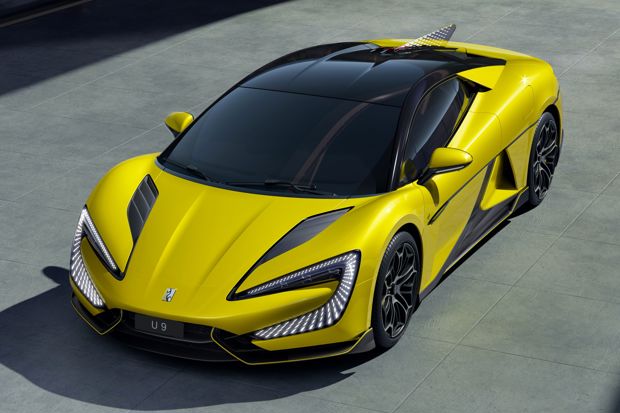
Content guide
- Aiways
- BYD
- Denza
- Firefly
- GWM
- IM
- Jaecoo
- Leapmotor
- LEVC
- Nio
- Omoda
- Onvo
- Seres
- Skywell
- Xiaomi
- XPeng
- Yangwang
- Zeekr
We're living in a new era of automotive technology as the switch to electrification gathers momentum which presents fresh opportunities for global car manufacturers to compete for a share of Britain’s market — and it's Chinese manufacturers that are seizing the initiative.
Since the 1960s we’ve seen German marques dominate upmarket and luxury car sales, Japanese brands muscle-in on affordable reliability, French firms leading the rise of diesel and now we’re entering the EV age it's brands from China — many of which are new to British buyers' ears — that are already garnering popularity.
China’s fast-paced development of new models is backed by natural resources on its doorstep, providing a decade's head-start over Western battery manufactures.
Combined with years of working alongside European, American, Japanese and Korean car firms to produce cars locally for consumers in China, as well as fostering its own innovators via a competitive educational system that values high achievements socially and academically, it's not a surprise to find Chinese car companies are the forefront of EV technology.
Regardless of technical leadership, most Chinese brands joining the UK market are relying on an old-school tactic that unites China's first steps in the UK with Korea’s establishment and Japan’s groundbreakers in years gone by — price. Yes, you'll find clever batteries, unusual styling and neat features when you look at new Chinese cars but the chances are you’re looking in the first place because many appear to be bargains.
So will these new and unfamiliar nameplates prove to be a short-lived sizzle with little substance compared with decades-old 'legacy' brands we've grown up with or will BYD and Jaecoo early-adopters reach the end of their finance deals eager to secure the latest models?
Here’s your complete guide to the new Chinese car brands that are new to the UK or expected to arrive here in 2026 and beyond.
You may also like
Aiways
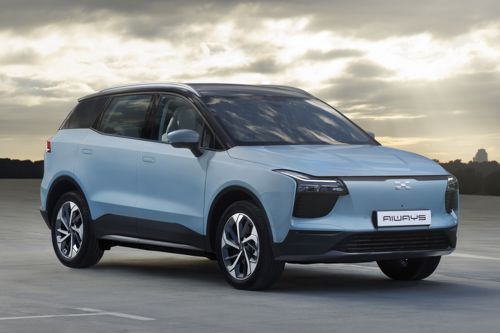
- Pioneering Chinese firm's now focusing on Europe
- Restructuring means original 2023 UK launch was delayed — but allegedly still due
- The U5 is appealing — but is it too late?
Chinese investment in electric cars is as enormous as early European and American enterprises around combustion engines, which means a lot of brands won't make it. Aiways was founded in 2017 with the aim of making an electric car you would fall in love with — 'ai' being the Roman alphabet equivalent to the Chinese character for 'love'.
In 2019 the U5 family SUV made its debut and the U6 saloon followed in 2020, with European sales starting the same year. Given what else started in 2020 it's unsurprising that this startup stopped prematurely. However Aiways is not out of the picture yet and the original firm has been restructured following bankruptcy, thanks to state intervention.
Sales and support in Europe, via Germany, are still very active, so we have to assume the UK launch — originally set for 2023 — is merely delayed. You can expect to see Aiways arrive here in 2026 if there's no announcement that it's not going to join the UK market after all before then.
Is it worth waiting for, though? In Europe the Aiways U5 sells from around £38,500 and offers a package and technology not that different from BYD or Zeekr. With a troubled beginning and delayed launches — and no high-volume sales in China to bolster manufacturing — it will take an innovative new model for this brand to restart effectively.
BYD
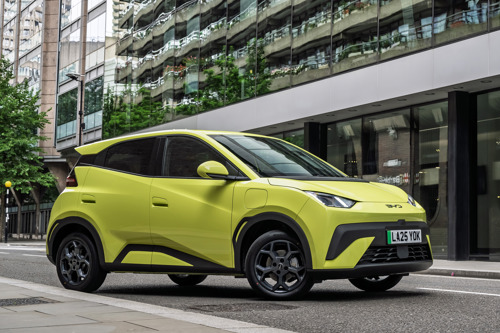
- Already the world's best-selling EV brand, UK debut in 2023
- BYD is banking on its roots as a battery innovator
- Low-cost and MPV options coming to the UK
Where most Chinese brands in the UK will be focusing on one or two models, BYD's ambitious plans mean that by the end of 2025 there will be a range of six electric cars, many named with an oceanic theme.
Recently joining the already on sale BYD Atto 3 SUV, the luxury-focused BYD Seal saloon and the affordable BYD Dolphin hatchback recently was the upmarket BYD Sealion 7 large SUV.
The Dolphin is one of the few sub-£300 per month, 0% APR new EVs you can buy — even the top-of-the- Dolphin Design model, with two-tone paint and bright interior colour options, has been offered at £299 deposit and £299 per month, yet that gets you a WLTP Combined cycle range up to 265 miles, more power than a Ford Fiesta ST and five-star Euro NCAP crash-test performance.
The Dolphin's no longer the brand's cheapest model — what's known as the Seagull in its home market has been upgraded and renamed the BYD Dolphin Surf for the UK, aiming to be the best value electric car available at its June 2025 launch. Further expansion arrives later in the year when the BYD Atto 2 goes on sale, offering a more utilitarian SUV-style small car which may be closer to British tastes.
It's not just electric cars that this brand sells — the BYD Seal U DMi is its first combustion-powered offering in the UK and naturally, it's a plug-in hybrid that claims to offer better performance than its rivals thanks to its EV-derived engineering.
BYD's lofty ambitions don't end with cars sold under that brand name, either — in the pipeline are models from other new marques it owns including Denza and Yangwang.
Denza
- BYD's premium range set to debut by end of 2025
- Cutting-edge luxury cars designed for China's wealthy young entrepreneurs
- A viable alternative to Porsche or Audi in Europe?
One of BYD's sub-brands, Denza is the stepping stone between BYD's regular range and the Yangwang U9 1300PS Lamborghini-rivalling hypercar.
Its debut model is the Denza Z9GT featuring European styling wraps a package that neatly sits between the Porsche Cayenne Coupe and Taycan Sport Turismo. It's sleek but usefully practical and is set to offer around 900PS in full EV form and over 850PS in plug-in hybrid guise.
Both versions feature three-motor all-wheel drive and masses of technology as standard including dual-chamber air suspension plus luxury-focused fit and finish to rival BMW, Porsche and Mercedes. The Z9GT can even park by crab-walking the back sideways into a space once you've put the front end in, thanks to the rear wheels' dual-motor arrangement.
Prices are subject to many external factors and technical tuning for the UK market but expect to pay around as much as £30,000 less than you would for similar ability and tech from a European brand.
There'll be more to come in 2026 with the arrival of the Denza D9 luxury MPV. This could prove very popular in a market used to personally importing high-end Nissan and Toyota JDM models.
Firefly
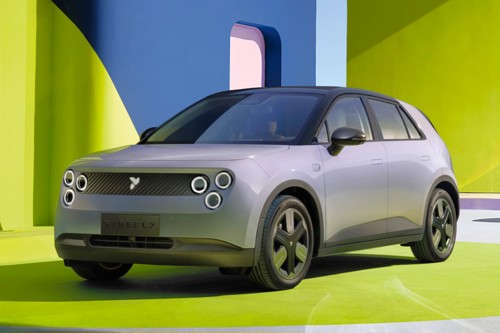
- Cute styling, fashion-lead colours and options
- Firefly should go on sale before the end of 2025
- Has the potential to be very popular but rivals are strong
Look at science-fiction renderings and the small car of the future frequently looks like Nio's standalone Firefly brand's compact electric hatchback.
Nio is positioning itself as a leader in infrastructure through battery-swap tech and the Firefly won't be a bargain-basement small EV either. It's aiming to be an upmarket, aspirational brand — and the so-far nameless small five-door takes on the Renault 5 E-Tech and its Nissan Micra clone in the style stakes as well as functionality.
Firefly does have a touch of Honda e in its looks but for the most part it's a clean and quite original style for a small EV. Expect a range of colours and trim options to maintain the fashion-first brand message and pricing more in line with MINI and Smart than Dacia or Leapmotor. Even so the Firefly should be good value — inside, it's bigger than you'd expect for a 4-metre long car. Passenger space is ample, there's a 404-litre boot and a 92-litre 'frunk' thanks to the compact rear motor design.
GWM
- GWM's combining brands sold separately elsewhere as a single entity in the UK
- Ora has been joined by Haval, others could follow if sales pick up
- Relatively new to the UK but an established presence in China
This isn't GWM's first rodeo when it comes to selling vehicles in Britain — it achieved a small following with the Great Wall Steed pickup from sold between 2013-2016.
Its Haval SUVs have been sold in China since 2005 where they top the sales charts regularly. It's a significant name for the company as it marked the point where it moved from manufacturing commercial vehicles and licenced local-market copies of Japanese vehicles to designing and building its own ranges. Various generations of Haval-branded cars have been sold in Europe but the GWM Haval Jolion Pro is the first to be offered in the UK.
As a fairly generic five-seater SUV, GWM needs the Haval Jolion Pro to have something special in order to stand out. For many buyers that would be its sub-£25,000 list price for a hybrid SUV with a five-year warranty and generous levels of equipment. Will that be enough to make this your first love — that's 'Chulian' in Chinese, this model's domestic market name — when buying a car from a brand you've likely not heard of before?
It shares showroom space with the GWM Ora 03 — the EV formerly known as the Ora Funky Cat — but GWM needs to expand its range swiftly to bolster sales that so far have lacked lustre.
IM
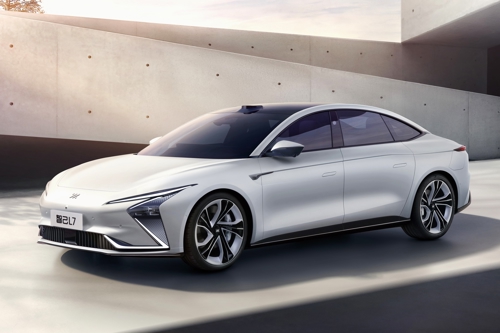
- Stylish electric cars penned by a British team
- Technical partnerships with Audi and MG's owner, SAIC
- Not to be confused with the established UK car importer IM Group
SAIC already has a strong presence in the UK thanks to MG and Maxus but its new IM brand is one that's taking aim at the high ground established by models such as the Tesla Model 3.
IM is not related to International Motors Group, the importers of GWM, Subaru and XPeng cars, so it may need to rebrand in the UK to avoid confusion. What's less likely is that IM's models will be rebadged MG to expand its range upmarket, although they're almost certainly going to be sold through the same dealer network.
As a technical partnership that includes sales-to-tech giant Alibaba, IM's first cars were produced in 2020 in the form of the low, luxury four-door saloon L7 and the range now encompasses four models, with the smaller L6 plus their SUV LS6 and LS7 counterparts. The latter is also offered as a plug-in hybrid.
The technology is advanced enough that Audi is hoping to leverage its joint venture with SAIC and IM to accelerate development of smaller EVs for Europe as well as Audis for the Chinese market.
Jaecoo
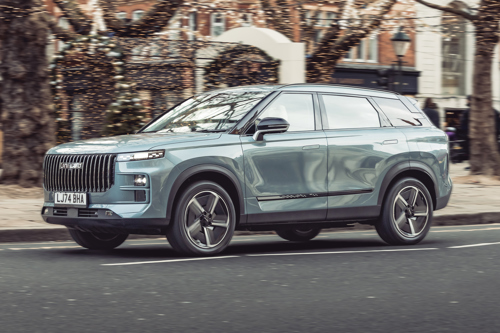
- Jaecoo is part of Chery Automotive
- First model already on sale is the Jaecoo 7 SUV
- Offers petrol and plug-in hybrid choices
Of the new brands to ramp up a UK presence late in 2024, Jaecoo seems to be one of the best-placed to succeed quickly. Its first product is the Jaecoo 7 is a family-sized SUV with more than a hint of Range Rover Velar crossed with some generic American styling aesthetics, yet it's original enough to be recognisable. It also has a name that’s easy to read and pronounce.
Next up for this brand is the smaller Jaecoo 5 SUV as it continues to share showroom space alongside Omoda's models. Both are part of the Chery Automotive, with the parent company recently confirming plans to offer its new budget-focus Lepas and style-led iCaur branded models in the UK by 2026.
Jaecoo is already earning respect from reviewers for overall value and quality but it faces strong competition from MG, Hyundai and Kia. A seven-year warranty and impressive plug-in hybrid technology give substance to the distinctive style for a sub-£40,000 SUV with a premium feel.
Leapmotor
- Established Chinese brand, working with Stellantis
- Affordable small EVs have proved popular elsewhere
- Advanced tech offered at entry level, outshines Dacia Spring for value
Leapmotor's entry to the UK is partly down to a relationship with the global giant Stellantis though it isn't owned by the Euro-American group. That means it shares nothing of significance with existing electric underpinnings of various models of Citroen, Peugeot and Vauxhall, among others.
Breaking onto the UK market with the low-priced Leapmotor T03 city car and the Leapmotor C10 family SUV, the brand is making more headlines than a corduroy pillow for offering the second cheapest new electric car you can buy.
Second cheapest does not sound that exciting until you realise the cheapest is the low-power, entry-level 45PS Dacia Spring, although Leapmotor has positioned the T03 against the 65PS version. The Chinese car has more power and a bigger battery which for many drivers that would be enough — but it's the standard equipment that makes the Dacia look like poor value. It's a similar story for the Leapmotor C10, though it faces far more competition.
Leapmotor plans to expand the range of models available annually, with the next release being the compact B10 SUV which may be manufactured in Spain as well as China.
LEVC
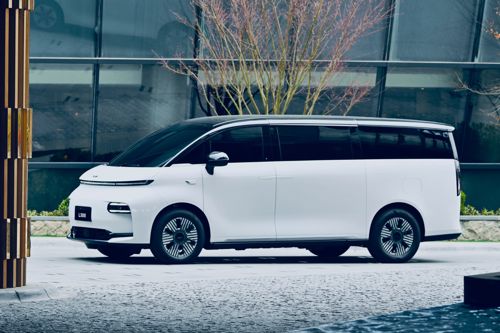
- Best known for making London taxis
- Manufacturing in Coventry remains true to the black cab's origins
- Range-extender tech with generous battery capacity is key
One of the better stories of British firms faltering before then being rescued is that of LEVC. That's short for London Electric Vehicle Company despite manufacturing taking place in Coventry as well as China thanks to its owners, Geely.
It's survived and thrived long enough to enjoy success thanks to its purpose-designed LEVC TX taxi which evolved into the LEVC VN5 van.
Using Volvo technology and an impressive range-extender EV approach to combining combustion engine and electric motor propulsion has kept the taxi competitive and gives the van plenty of appeal for small, city-based businesses.
Its next move is into the ranks of luxury electric MPVs with its gargantuan LEVC L380, named in honour of the Airbus A380 airliner. Despite the airline-like seating and upmarket focus, LEVC promise it will retain the multi-purpose van-like ability of classic MPVs when sales begin in 2026.
Nio
- Already an established brand in European markets
- Nio's electric cars are powered by swappable battery packs
- In theory, a swap takes less time than refilling a fuel tank
Of all the Chinese marques coming to the UK, Nio should probably be renamed Godot — we're still waiting. The Nio ES8 has been on sale in Europe since 2021, though the speed of building the firm's battery swap stations has not matched the development in China where there are thousands of the facilities.
Nio's ET5 and ET7 were announced as the first models to come to the UK, rivalling the Tesla Model 3 and Model S but given they were expected in 2024 and haven't yet appeared, there's a chance that one of Nio's subbrands — Firefly and Onvo — might do so first.
Using a 'whole-stack' approach Nio not only provides infrastructure and battery swap technology, it develops software, batteries and technology in-house for a bespoke and cohesive approach where many EV manufacturers are buying in and joining OEM components. Nio features include 900V architecture and more efficient motors, as well as driver assistance tech that aims to beat Tesla's 'self-driving' autonomous modes.
Omoda
- Omoda is Chery’s mainstream brand
- The Omoda 5 and E5 look futuristic for a bargain price
- A choice of petrol, electric and hybrid models coming soon
Where the Jaecoo 7 looks distinctively cool, the Omoda 5 is a rather generic 21st Century SUV, with a few styling cues that say 'electric car' even when fitted with the petrol engine. Well-equipped and with a seven-year/100,000-mile warranty, the Omoda 5 offers generous passenger space and good on-paper performance for a price substantially lower than many small SUVs. Its 1.6-litre TGDI petrol engine produces 186PS, delivering a 0-62mph sprint in 7.8 seconds, while features such as adaptive cruise control are standard.
The electric Omoda E5 is closer to the new wave of Chinese cars coming to the UK, with impressive range and equipment levels. The existence of MG, BYD and GWM in the EV sector mean that the Omoda E5 is a relatively average price for the size and class of car, though.
Move upmarket and the new Omoda 9 offers a lot of space and 92-mile electric range for a sub-£50,000 plug-in hybrid SUV. The forthcoming Omoda 7 looks a little braver, more distinctive as the brand finds its own identity.
However, for now Omoda is about value — from around £25,000, with 0% APR and low deposit offers, the petrol-powered Omoda 5 exemplifies the competitive strategy that helped Japanese and Korean brands get a foothold previously.
Onvo
- A new brand even by China's standards, Onvo is already popular
- Family-friendly, affordable counterpart to Nio's upmarket EVs
- Battery swap and 900V architecture put the Onvo L60 ahead of rivals
Another of Nio's sub-brands, Onvo launched in China 2024, with the expectation that it will reach the UK before the end of 2026. Its debut model is the value-centric Onvo L60 — an SUV that targets the same buyers as the Tesla Model Y.
Technically Nio is treating Onvo as a more mass-market brand, yet in much the same way that Volkswagen Group sometimes introduce new features on SEATs and Skodas rather than Audi, the Onvo L60 marks the debut of Nio's 3rd-generation 'whole-stack' approach, in which the firm develops and controls a lot of the technology rather than buying in components. New LFP blade battery tech and motors that are more efficient than Tesla should allow an impressive range from the 60kWh model but an 85kWh version is also available in China.
We're yet to see prices for the Onvo L60 in the UK but it's roughly £24,000 in China. It's possible that Onvo, like Firefly, could be available before the end of 2025.
Seres
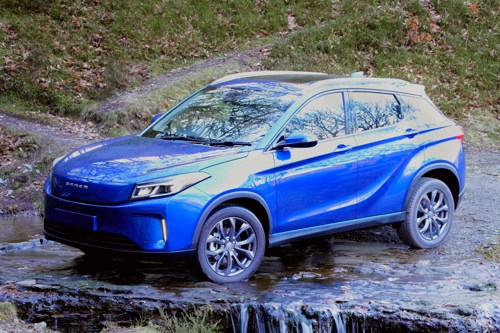
- Seres plans to expand its European presence
- Seres 3 made a brief appearance, but is on hold
- Would Huawei make more sense here?
Seres started out in 2016 as SF Automotive, with expertise from Tesla co-founder Martin Eberhard. From inevitably ambitious startup origins, Seres's biggest win is partnering with Huawei to make the eponymous smartphone brand's AITO connected cars — but there are no plans for the Huawei name to re-enter the UK market, on smartphones or cars.
Seres has slowly been expanding its European presence, where the Seres 5 is gaining popularity, yet alongside the cutting-edge AITO-derived cars there's the simpler Seres 3 — an electric version of the DFSK Glory, a model that was due to go on sale here but ultimately didn't. The same importer, Innovation Automotive, price-listed the Seres 3 in 2024 before sales essentially ended before they began, leaving it to concentrate on Skywell in the UK instead.
If Seres does make a UK comeback with another importer it will be interesting to see if it tries to compete at the entry level again, or leverages the high-tech DNA and futuristic styling of the AITO-derived models.
Skywell
- Imported by Innovation Automotive, Skywell offers a big car for a low price
- Small dealer network and lack of brand recognition
- First steps suggest quality will need to improve to gain traction
Skywell is, inevitably, part of a large Chinese industrial group — one that makes buses, set-top boxes and everything in between. In its domestic market it's called Skyworth and it's one of the new wave of New Energy Vehicle firms started in the 2010s. As such, there's a lot of expertise underpinning the first model to arrive in the UK, the Skywell BE11.
A larger family SUV for the price of a well-specified small one, it looks flash inside, has 204PS to move it to 62mph from a standstill in 9.6 seconds and has a long range 86kWh bettery option, providing a WLTP Combined cycle range of 301 miles — all for less than £40,000.
With a seven-year warranty and lots of passenger space with a large boot, the BE11 is a rival for the Skoda Enyaq and similar European electric SUVs, but it may be hard to find a dealer nearby to check one out.
Range expansion is set to occur over the next 12 months with the introduction of the Skywell X electric hatchback and a large, battery-powered panel van.
Xiaomi
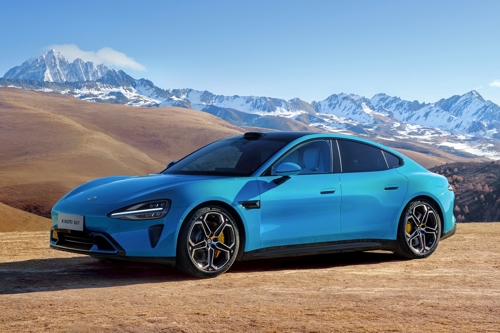
- Smartphone and technology brand brings rapid luxury EV to the UK
- Tuned on the Nurburgring and features 24ct gold bling
- Sleek four-door coupe SU7 avoids SUV predictability
Remember all the rumours of the Apple Car? Well, a different brand better known for its tablets and smartphones has got there first — step forward Xiaomi.
Perhaps unsurprisingly, as Xiaomi's SU7 Ultra holds the record for the fastest four-door saloon car on the Nurburgring, it and can reach 62mph from nothing in 1.98 seconds. Fortunately for more relaxed drivers, the RWD SU7 Pro and AWD SU7 Max are quick, but make do with 299PS and 673PS respectively rather than the Ultra's 1547PS three-motor setup.
Alongside the usual suite of autonomous and connected technology, Xiaomi's experience in consumer electronics means the supercar-esque interior has attachment points and power supplies for cameras, smartphones and other gadgets. Most features are already built in. Reflecting the aspirational nature of the SU7 in China, the badge of the launch-edition Ultra is made in carbon fibre and 24 carat gold plate.
Sales in China have been impressive and it's likely that when it does come here the Xiaomi SU7 will prove popular thanks to the entry-level model's visual connection with the record-breaking Ultra. For drivers who do want an SUV, don't worry. The YU7 SUV is on the way as well — though, with prices tipped to start over £60,000 for the SU7, the YU7 is going to have strong competition.
XPeng
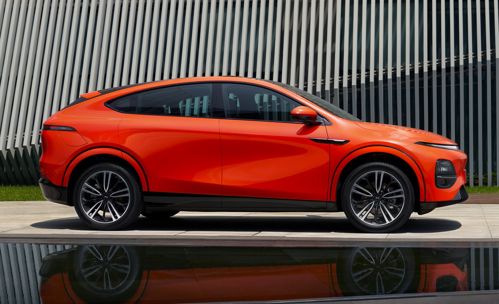
- Luxury brand takes aim at Tesla
- G6 SUV first to arrive, X9 luxury MPV next
- Electric-only with cutting-edge battery tech
Showcasing the aspirational quality of China’s automakers, XPeng is widely considered to be one of the stronger challengers to take Tesla’s market share in Europe despite having the tariff-attracting disadvantage of being a wholly-Chinese brand without a European partnership.
The first model on sale in the UK, the XPeng G6, features high levels of equipment for a low price. As it's been on sale in China for two years with a proven track record, it's not exactly the early-adopter risk for British buyers that it may otherwise seem.
XPeng is an early adopter of LFP battery technology, reducing reliance on cobalt and nickel as well as offering a longer battery lifespan. Volkswagen Group has signed joint venture agreements with XPeng to use the firm’s technology in future models, initially for the Chinese market. Like GWM, XPeng’s UK presence is handled by IM Group — the firm behind Subaru, Isuzu and after sales for Mitsubishi. This is particularly relevant when you consider IM Group was also Hyundai’s route into the UK market in 1982.
Yangwang
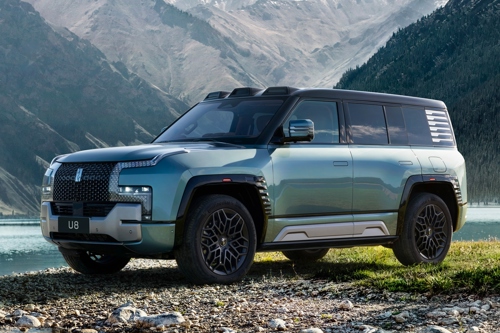
- Upmarket performance brand from BYD
- Hypercar that hops, and an SUV that floats
- Branding is on-point, name might hold it back in the UK
In China, Yangwang is an aspirational brand from BYD and there's a lot that's dream-like about the range.
Starting with the U8, a four-motor electric SUV with the ability to spin itself around in a 'tank turn', top models feature a semi-amphibious 'floating' emergency mode to deal with flash floods or off-road errors.
We're more likely to see the smaller Yangwang U7 first, a luxury saloon that manages to look distinctive and attractive, while some details evoke thoughts of classic Jaguar thinking. Yangwang sits above Denza but shares some styling elements and technology.
Fans of TikTok and social media generally will know of the Yangwang U9, the brand's 1290PS supercar. It's the fastest Chinese production car with a top speed of 243mph but aims to deliver comfort as well with DiSus dual-chamber air suspension. It reacts so quickly that the car can be made to jump. With the state of Britain's roads, a car that can hop over a pothole has a certain appeal...
Zeekr
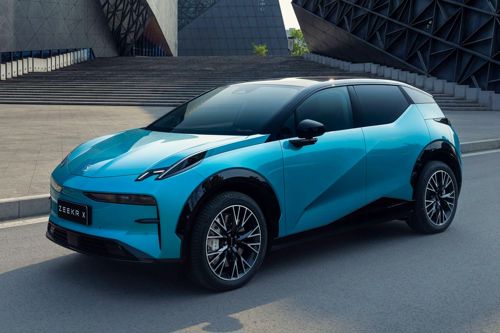
- Youthful luxury brand related to Polestar and Smart
- Zeekr provides the foundation for the Lotus Eletre
- Long range, high performance and distinctive style
You can already buy some of the tech Zeekr will bring to the UK — just shop for a Polestar, an electric Volvo, a Smart or a Lotus.
They're all part of Geely Group and Zeekr for the UK is a second-thought at the luxury and car subscription market that Lynk & Co was originally pitched to serve. As with how the defunct brand Daewoo was intended in the UK 30 years ago, the plan is to 'cut out the haggling and inconsistency of dealers' by selling direct to consumers.
Lynk & Co, the 2016 Sino-Swedish startup designer brand never made it to the UK — and now likely never will — but Volvo took some aspects of the original sales proposition. Elsewhere in Europe, as well as China, Lynk & Co has been moderately successful since 2020.
Zeekr is likely to offer the Zeekr X — it's an alternative to the Smart #1 and Volvo EX30 which are based on the same underpinnings — and the Zeekr 001, a Porsche Taycan Sport Turismo rival that shares technology with the Polestar 4.
Zeekr's established models are known for autonomous driving, including being used as Waymo taxis. Given the brand's aspiration for contactless, subscription-based sales, maybe 2026 will be marked by a luxury car that can drive itself to your door to ask if you want a test drive.
Chinese-made cars using Western brands in Britain
MG Rover brought the aspirations of China’s auto industry to the fore when the bankrupt British automaker was subject to a bidding war and contractual complexities between Shanghai’s SAIC group and Nanjing’s NAC. Both state-owned firms won different parts of the group but as SAIC and NAC ended up merging, the end result was the same.
MG ended up owned by SAIC along with several other dormant brands such as Austin and Morris but not Rover, while some of MG Rover’s technology was reused in new, Chinese-built models. Ultimately the MG brand ended up applied to completely new cars, though the design and development still owes something to the UK operation — the MG Cyberster is a very worthy halo model. MG's parent firm SAIC also owns Maxus — the commercial vehicle brand which also sells a pair of upmarket MPVs in the UK.
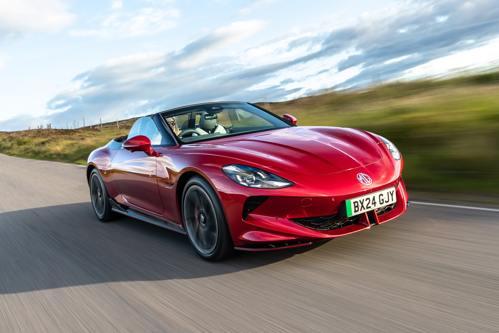
MG isn’t the only Western brand with Chinese ownership and engineering — Volvo, Polestar and Lotus are owned by Geely, while Smart is a 50:50 joint-venture with Mercedes.
For a real piece of history, Chery also manufacturers the Moke EV, a continuation/evolution of the 1960s Mini Moke lightweight fun car.
A changing landscape — premium becomes mainstream
Until recently, German brands set the benchmark for trust, quality and innovation. Yet reinventing the concept of the car from fossil-fuelled engineering to battery-powered technology has allowed Chinese manufacturers to set the pace. Volkswagen is already feeling the strain and Ford looks like it is all but abandoning traditional markets and factories in Europe.
One of the factors eroding innovation and aspiration is the level playing field of monthly payments and residuals — it's been decades since an Audi, BMW or Mercedes was truly an effective status symbol and there's been very little to rekindle the emotional link between drivers, cars, aspiration and lifestyle.
On the domestic market China's manufacturers have taken the lead in EV technology, including being the preferred choice of Western manufacturers as OEM partners. The time has come to see the state of the art from China's automakers, rather than the art of the state in releasing only cheap, second-rate models for export.
From solid-state battery tech, to in-car communication and truly extreme performance, the Chinese car industry in 2025 has rather more to offer than cast-off clones. Startups and innovators, experiments and new approaches define the wider landscape, but Europe will only get the most appropriate and marketable options for now.
Unlike the predictability of a four-ringed logo ensuring the success of a small-engined, front-wheel drive compact SUV, or yet another brand applied to a Stellantis common platform, Chinese brands have little emotional baggage or preconceived values to project. They're perfect for a new generation of drivers — and those who are disillusioned by ever higher monthly payments for the same warmed-over tech from more familiar names.
The British market is going to see a lot of new brands emerging, at various price points, and they want to win hearts as well as minds. Expect personalisation, convenience and AI-driven assistance that owes much to the smartphone and personal electronics industries than they do the automotive world.

